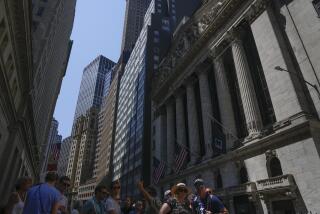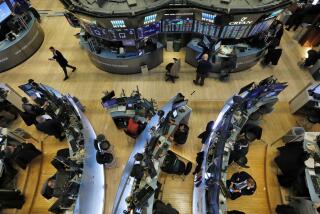MARKETS REACT TO KUWAIT CRISIS : CURRENCY : Kuwait Invasion Puts Dollar on Roller Coaster
- Share via
NEW YORK — The dollar shot up Thursday on news of the Kuwait invasion but dropped back close to Wednesday’s levels against other major world currencies in response to further news developments and a growing conviction among economists that higher world oil prices may work against the dollar.
Traders said the dollar spent the day on a roller coaster, reacting sharply to news developments such as reports that Syria might support Iraq or that Iraqi officials said the country’s troops may soon withdraw from Kuwait.
“The dollar brushed aside momentarily the (economic) fundamentals and looked strictly at the political maneuvering” related to events in the Middle East, said Giuseppe Dose, manager of foreign exchange trading for Bank of America in San Francisco.
In times of world political crisis, such as outbreaks of military hostilities, the dollar often rises. It is regarded as a “safe haven” currency, because of America’s military strength and its geographical remoteness from areas of conflict, such as Kuwait.
But William Stirling, manager of international economics at Merrill Lynch Capital Markets, said higher oil prices are more likely to lead to higher interest rates in West Germany, other Western European countries and Japan, than in the United States. As a result, he said, a sustained rise in oil prices may cause the dollar to drop.
The reason, he said, is that the Japanese and West German central banks are in a relatively good position to raise interest rates to counteract the inflationary effect of higher oil prices. But the U.S. Federal Reserve, concerned about a weakening domestic economy and the current precarious state of the nation’s banks and savings and loans, probably won’t be able to raise U.S. rates. A rise in foreign interest rates would be a negative for the dollar because money tends to flow into the currencies of countries offering higher interest rates on investments.
In U.S. trading Thursday, the dollar reached peaks of 1.6210 German marks and 151.55 Japanese yen. It then retreated to 1.5970 marks and 149.30 yen. Traders said the dollar ended the day higher against the yen because Japan is entirely dependent on oil imports.
Ara Jelalian, international economist at the First National Bank of Chicago, said high oil prices may serve to propel British sterling even higher from its already high level against the dollar, since Britain is a significant oil producing country.
THE DOLLAR GAINS GROUND The dollar moved sharply higher on news of the Kuwait crisis, but fell back somewhat on worries that an oil price hike may ultimately hurt the dollar.
Japanese yen per $1, daily closing rate in New York THURSDAY’S PEAK: 151.55 FINAL RATE (N.Y.): 149.30 Source: Data Resources
More to Read
Inside the business of entertainment
The Wide Shot brings you news, analysis and insights on everything from streaming wars to production — and what it all means for the future.
You may occasionally receive promotional content from the Los Angeles Times.










